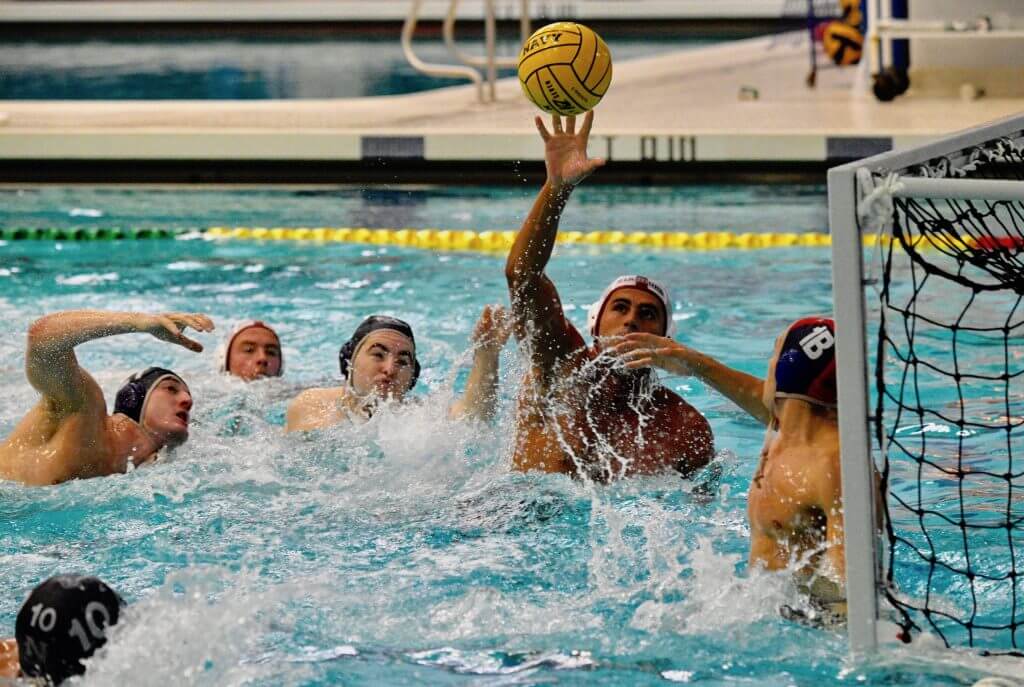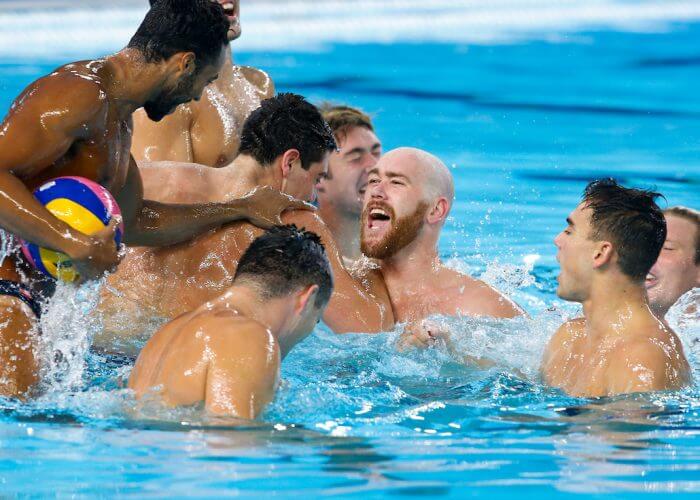Stanford’s Hallock Talks Cardinal Water Polo and the U.S. Men’s National Team

ANNAPOLIS, MD. Even thought it’s early, no one in American water polo has had a better year then Ben Hallock, star for Stanford and the senior U.S. team’s main two-meter man. After a stellar 2018 collegiate season, in which he led his team to it’s first NCAA final in a decade, last June Hallock receive the highest collegiate accolade in the sport, being honored as a Cutino Award Winner—given annually to the country’s best male and female polo players—alongside fellow Cardinal Makenzie Fischer.
 For an encore, Hallock and his national team mates went down to Lima, Peru for the 2019 Pan American Games, where the American went on an undefeated romp, capturing an eighth-straight gold medal, and with it, a berth in the 2020 Olympic Games in Tokyo.
For an encore, Hallock and his national team mates went down to Lima, Peru for the 2019 Pan American Games, where the American went on an undefeated romp, capturing an eighth-straight gold medal, and with it, a berth in the 2020 Olympic Games in Tokyo.
Right after the biggest victory of the Olympic qualification cycle, Hallock was back at Stanford, preparing for a new season—one that he and his Cardinal teammates hope will end in a national championship. On Sunday at Navy’s Lejeune Hall pool deck, Hallock spoke with Swimming World about his excellent adventure (so far) in 2019.
– You’re coming off representing the U.S. in Lima, Peru at the Pan American Game, and you’re now a double Olympian.
Every summer, being able to represent the US is something that I hold dear to my heart. It’s something that I’ll remember for the rest of my life.
Just being able to stay healthy throughout these few couple years and go play abroad is something that is incredibly fun. You learn so many things along the way. And I know hopefully I can continue that, knock on wood, no injuries over the next year.
Hopefully, I can continue being able to be on the team and increase our success.
– But now the goal now is to stay healthy, take classes at Stanford… and compete for the Cardinal.
It’s pretty nice because we don’t start school until late September. You finish national team [play], you typically have around a week off, and then you’re just in preseason, just focusing on water polo with Stanford, being around the guys for the first time in two or three months.

The U.S. men’s team celebrates after qualifying for the Tokyo Olympics at Pan Ams. Photo Courtesy: Enrique Cuneo / Lima 2019
You really get to bond with them and not worry about school for the first month or so, which is a huge advantage to quarter schools.
It’s a balance and you have to make sure that you get the appropriate time off so you’re not getting burned out. But I think it’s something that’s been pretty easy to manage.
– The difference with Stanford is that you’re not only playing water polo at the highest level, but you’re also at one of the best academic institutions in the world.
The type of kids that go to Stanford, having that coursework isn’t such a burden as it is on other people who go to different schools. It’s been built into your life all along. So, it would be incredibly challenging for a lot of people. But you get an extremely driven kid, not just in the pool, which I think all these teams have, but also in the classroom.
– You had a fantastic year last year, Cutino Award winner, MPSF Player of the Year. You’ve gotten all the individual accolades. But one that’s missing from your resume, which is a national championship.
At the beginning of the year, the goal is to win a national championship. You never set out saying, “I’m going [for] this personal award.” No one ever does that.
You want to do what’s best for the team, and those typically are given to the players who play the right way. That’s what I believe in. And it’s starting the season again. I’m not setting out to win any personal awards. I’d like to win another championship first. I’d rather win that and not win any personal awards. I think that would signify a much more successful season.
– Is it true that your Dad went to USC?
Yes, both my parents went to USC.
– It just seems like the rivalries. Obviously, UCLA versus USC big, but there’s certainly no love lost between Stanford and USC.
I think last time when we were watching the football game, he was cheering for the USC football team, just because he played football there.
But when I decided to go to Stanford, my parents were thrilled about it. My sister went to Princeton, and so they understand how important their education is. It was just a different opportunity at Stanford [than at USC].
I couldn’t pass it up.



